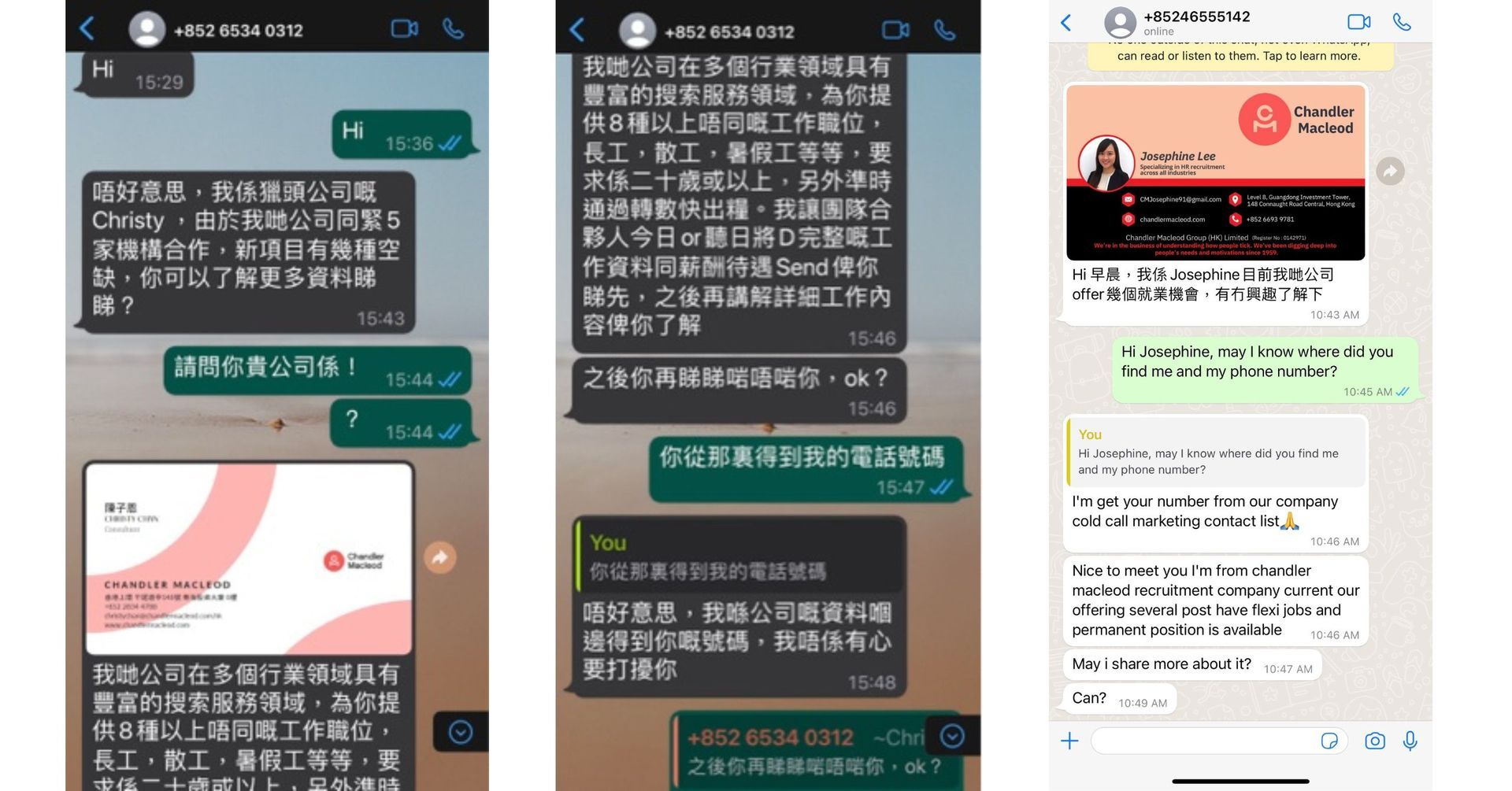Recently, there has been an increase in the number of job scams and fraudulent recruitment activity. In the recruitment industry where contact details are easily accessible to the public, we’ve noticed an uptake of many perpetrators impersonating as Chandler Macleod staff members and using false identities to carry out their scams, including getting personal information, money, or unpaid work out of innocent candidates.
We would like to raise awareness on how to identify these cases and what steps you should take should you encounter these scams.
Lately, we have witnessed numerous scammers misappropriating our company logo and using identities of our previous and existing employees to create a false e-business card to contact potential job seekers via WhatsApp and Telegram about job offers. You can see some examples below:

While our consultants may contact you about job opportunities, we will never:
- Ask for your personal information such as HKID number, credit card details, or any other personal financial information at the initial stages of the recruitment process.
- Ask for any monetary payment of any kind.
- Make any job offers without going through the proper recruitment process, which includes face-to-face contact and interviews with our partnered clients.
- Offer freelance jobs
- Use WhatsApp as the first attempt of contact. All consultants will only use WhatsApp if you cannot be reached via phone call or email.
How to spot fraudulent recruitment activity
- Think critically and cautiously when receiving phone calls, messages and emails from people you don’t know. It can be helpful to ask for a video chat to verify a person’s identity if you are very unsure, this way you can see if they match the identity of the person they claim to be.
- Do not provide personal information such as usernames, PINs, passwords, passphrases or secret/security questions and answers to anyone you aren’t familiar with, especially via WhatsApp and Telegram.
- Pay attention to the small details such as logos, language used, sentence structure. Are logos the correct colours and shapes, are they blurry or cropped? And are the words used by the sender professional or is their sentence structure broken and unusual? Do they attempt to create a sense of urgency or fear from you?
- Be aware of unverified email domains. We will never send emails using domains such as @gmail.com, @yahoo.com.hk, etc., other than the official company email domain.
- It is likely a scam if they are using a mobile number as the official contact number. Every consultant has a company direct line. If you are unsure, please contact our general line 2833 4100 for verification. In addition, the government has made a public statement to beware of numbers starting with +852.
- Keep an eye out for the incorrect website domain. All Chandler Macleod business conducted in Hong Kong uses www.chandlermacleod.com.hk.
- Be careful opening messages or attachments and clicking on links from unknown senders.
What to do if you think you are being targeted?
To exercise caution, should you receive links from a suspected scammer, please do not click on them as they could be phishing/hacking links, in which your personal or sensitive information may be stolen.
If you have any doubt of the authenticity of a message that appears to be from our business or any of our staff members, we ask that you contact us for verification on our main line at 2833 4100 or email us at hk_enquiry@chandlermacleod.com.
What you can do if you fall victim to these scams:
- Secure your accounts immediately by updating (re-setting) passwords.
- File an e-report to the Hong Kong Police Force.
- Call the Fraud Prevention Hotline 3423 6611 (You can learn about the new hotline in this Media Statement).
How to protect yourself online:
- Keep your passwords secure!
- Avoid using the same password across multiple accounts.
- Use multiple forms of authentication where possible. Multi-factor authentication (MFA) is a security measure that requires two or more proofs of identity to grant you access to accounts, it is a good idea to use MFA on all accounts that contain personal and / or financial information.
- Do not use untrusted communication channels or devices to transmit or access personal data.
- Do not disclose any personal data to unknown or untrusted parties on social media.
- Do not disclose or share your account identities, passwords, and devices.
For more information about Identity theft and how to protect yourself, please visit https://www.infosec.gov.hk/en/knowledge-centre/identity-theft










